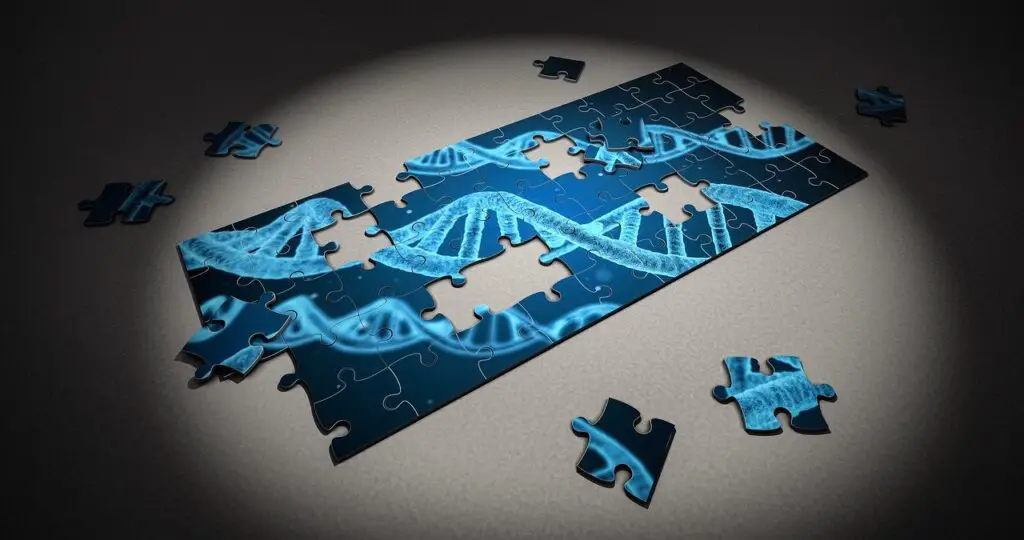How Mutation Is A Random Process?
Is mutation a random process?
Yes, mutation is a random process. This random process is a significant part of evolution.
In this respect, mutation can happen at any time and so are randomly occurring. Hundreds to thousands of mutational changes over the DNA sequence adds together to bring out various evolutionary changes in the living body.
It is also to be noted that, whether a particular mutation happens or not, is generally unrelated to how useful that mutation would be.
Mutation is a random process or error that occurs while copying the DNA during cell division by causing changes in the nucleotide segments of the DNA.
Mutations are somewhat occurring without definite aim, reason, or pattern. It can happen at any time frame due to exposure to UV radiation, viral replication, mitosis, or meiosis, or other types of damage to DNA (such as pyrimidine dimers, etc).
That’s why mutation is a random process or a kind of a random error that can happen at any time (nobody knows when) by DNA replication mistake or by impact from any external sources without any definite time interval.
Such random errors, over the long run, can have a significant impact on the genome, leading to the creation of new genes from ancestral genes, or can force stop the production of proteins from ancestral genes making them part of ‘Junk DNA’.
Evolutionary forces like natural selection, genetic drift, etc. can act on such mutated genes to create an all-new set of genes.
Various types of mutations can take place over the genome throughout the millions of years of evolution to create great evolutionary changes in the biological body.

How mutation is a random process?
YES, it’s true that mutations are random and so, it may happen at any time without any definite aim, reason, or pattern in the biological body.
According to the Kimura Neutral Theory, the changes in the DNA sequences within and between species have only minor or no selective effect. Such minor differences have arisen mostly through the various random processes called mutations at the nucleotide level (molecular level of DNA).
Mutations have been known to occur randomly and regularly, and so over the long run is one of the key reasons for differentiation and evolution within and between the species.
Mutation is in fact random and not directed because during cell division i.e. either during mitosis or meiosis, or during exposure to UV radiation, viral replication, etc. an accidental alteration or deletion of the nucleotide sequence during the process of DNA (gene) duplication happens.
During the process of cell division, that is during meiosis in gametic cells and mitosis in somatic cells, the cells during its cell division all of its DNA is duplicated first, and then half of the DNA content goes to one daughter cell and a half to the other daughter cell.
So, the cell always tries to duplicate itself perfectly. The genomic molecular machinery includes DNA polymerase enzyme that proofreads the DNA replication process and ensures the correct duplication of the new DNA strand from the the template DNA strand.
But still in some of the cases, whenever a cell divides there occurs occasionally (rarely) small copying errors that are not corrected. Such as A (adenine) can get inserted in the new strand, rather than G (guanine).
Also, other factors like exposure to UV radiation and harmful chemicals can also cause the creation of a free radical that interacts with and oxidizes DNA bases. These oxidized bases don’t pair correctly during replication, causing various mutations.
Also due to UV radiation, the formation of cyclobutane pyrimidine dimer can occur in the segments of DNA (genome) occasionally. This is called Dimerizing mutation that prevents pyrimidines from base pairing, and also prevents DNA replication.
Also, we know that viruses don’t have stable DNA or RNA genome and so are continuously changing as a result of genetic selection. They undergo subtle genetic changes through mutation and major genetic changes through recombination.
So, when viruses do infect the body of higher animals they do replicate viral DNA particles inside that animal genome that may lead to either directed or mostly random mutations occasionally.
Such of all above mentioned process are instances that do occur rarely leading to random mutations.
NOTE: In some cases, it is also to be noted that the statement that mutations are random is both profoundly true and profoundly untrue at the same time. In most of the cases, mutations are randomly occurring and less directed (non-random).
Why is mutation random and natural selection not?
Yes, it is true that mutation is random, but natural selection is not.
It’s because a single occurrence of mutation can occur randomly without any definite aim or purpose. While on the other hand, a single occurrence of natural selection acts on the various mutation caused genetic variations of the genome to bring out a notable adaptation to the biological body.
Mutations can occur randomly, while natural selection is directed by the mutational forces to act upon the genome in order to bring out the evolutionary changes in the biological body over the long run.
Meaning that various kinds of mutations occur for hundreds to thousands of years, and natural selection is an evolutionary factor that acts after the occurrence of such mutations to bring out what is beneficial kind of adaptation most of the time.
Natural selection selectively selects only those mutations that aid in the survival and reproduction of the offsprings to pass on to the next generations. The less fit and unfit ones are destroyed.
So, genetic variants due to mutations that aid survival and reproduction are much more likely to become common than variants that don’t.
To understand better, you can consider natural selection as randomly occurring that contains both random and non-random components. However, in the other case, the genetic changes (or mutations) are filtered by natural selection to come about randomly.
Is mutation possible without evolution?
Yes, mutation is possible without evolution, but evolution is not at all possible without mutation taking place in the genome.
It’s because a single occurrence of mutation is not enough for evolutionary factors like natural selection to act upon to bring out the various evolutionary adaptations.
As we all know that, natural selection and genetic drift are types of evolutionary factors that don’t act upon one or two occurrences of mutation but on hundreds to thousands of mutations that have occurred over the thousands to millions of years of evolution.
A single or two or three mutations will just lead to the alteration of the DNA sequence of the genome. So, mutation is actually possible without evolution.
On the other hand, numerous mutations over years will eventually lead to the formation of new alleles (versions of the genes) or also can create new genes with new alleles, and so will result in evolution.
So, it is pretty much clear that a few of the mutations can occur without causing evolution. However, when numerous mutations occur over years then this can definitely lead to evolution.
And so, yes, mutations are essential for evolution but one or two or a few of the mutations are not enough to cause evolution.
It’s because when numerous mutations happen on the same genome then a notable change in an organism’s DNA occurs that can cause changes in all aspects of life leading to the evolution of the biological body.
And, it is also to be noted that mutations over years (thousands to millions of years and not in a one or two years timeframe) are essential for evolution. They are the raw materials and key reasons for genetic variations and so without many mutations, evolution could not happen.
Is evolution a random mutation?
Evolution can occur due to the following evolutionary forces that act upon the biological body. These include mutation, genetic drift, gene flow, and natural selection.
Thus, you can also say that evolution is actually the product of random mutation. Random mutations are chance events and can occur at any time.
So yes, evolution is the result of random mutation along with the other evolutionary forces viz. genetic drift, gene flow, and natural selection, because mutation alone cannot lead to evolution.
In other words, evolution is a totally random occurrence. As it is a product of mutation that is random along with random genetic drift, non-random and random genetic flow, and non-random natural selection.
Evolution is notably driven by two factors mostly. The first is the random mutation that happens at small scales, while the other one is non-random natural selection that happens on the large scale. The key reason for the same is to promote the survival of the species.
Random mutations are chance events but the result of the mutation may be harmful or useful. Non-random Natural selection is directed upon the altered genome to favor mutations that are useful and eradicate the harmful ones leading to evolution.
Mutations causing variations often alter gene structure, activity, or protein function, thus introducing different traits in an organism over time.
Over time, as generations of individuals with the trait continue to reproduce, the advantageous traits get passed to the future population, making the population different from the ancestral one, due to natural selection acting on the biological system.
Thus, new species gets formed from the ancestral species. This explains how evolution is a product of random mutations and other evolutionary factors as well.
